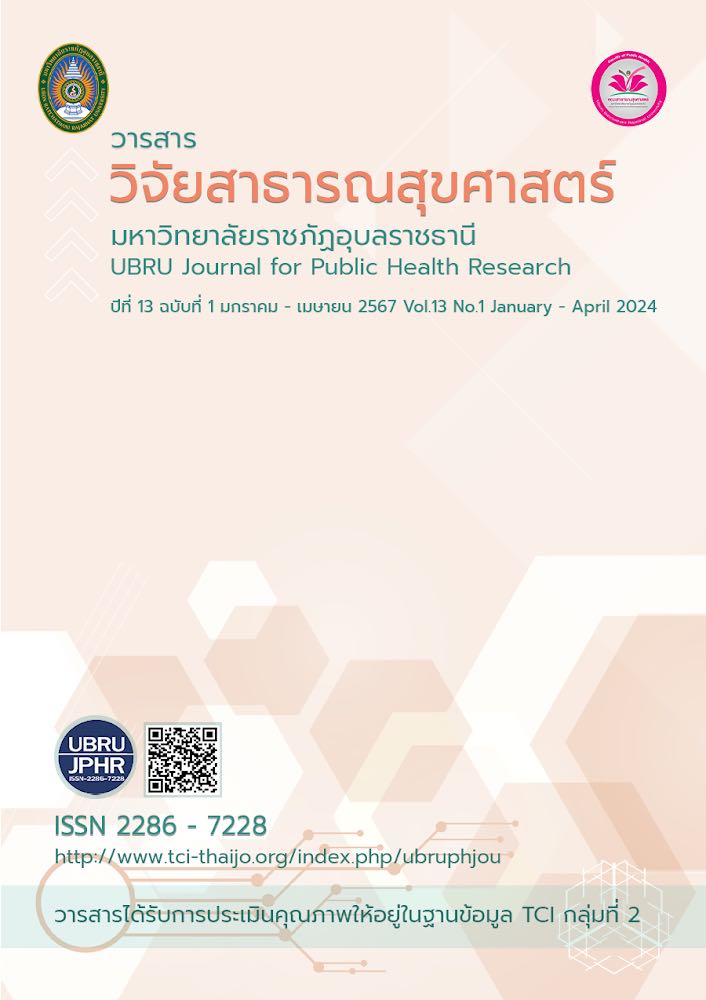The caregiving burden in primary caregiver of school-age children with specific learning disabilities
Keywords:
Caregiving burden, primary caregivers, school-age children, specific learning disabilitiesAbstract
This research is a cross-sectional descriptive study. The objective was to study the emergence of feelings of caregiving burden in primary caregivers of school-age children with specific learning disabilities (SLD). The sample size was determined using Krejci and Morgan tables and stratified random sampling. In order to get a sample of people to be the main caregivers. There are 280 school-age children with SLD under supervision who are studying in grades 1-6 of inclusive schools in Sisaket Primary educational service Area 1-4. Data were collected using a self-administered questionnaire, including a personal information questionnaire for primary caregivers and school-aged children with SLD and a questionnaire on perceptions of caregiving burden in primary caregivers. The data collection period is December 2022 to March 2023. The statistics used in data analysis include percentage, mean, and standard deviation.
The results of the study found that the majority of primary caregivers were female (73.2%) by related to the child's mother (51.1%) and aged between 40-58 years (52.5%). The Primary caregivers feel a burden in caring for school-age children with SLD. It was at a moderate to severe level (55.85 %) Summary from the research results found that Primary caregivers feel the burden of caring for school-aged children with SLD. It is at a moderate to severe level. Therefore, agencies, health teams or those involved need to be aware of the burden felt by primary caregivers in caring for children with SLD to plan further assistance for families and school-aged children with SLD.
References
วรสิทธิ์ ศิริพรพาณิชย์. (2566). รู้จักหนูคนพิเศษ และหนูน้อย LD. สืบค้นเมื่อวันที่ 20 กรกฎาคม 2566 สืบค้นจาก: https://www.rakluke.c com/component/tags/tag/2020-05-29-09-51-46.html
วัลนิกา ฉลากบาง. (2535). จิตวิทยาและการแนะแนวเด็กประถมศึกษา. กรุงเทพฯ: โอ.เอส. พริ้นติ้งเฮาส์.
วินัดดา ปิยะศิลป์ และวันดี นิงสานนท์. (2558). Children with Disability. ราชวิทยาลัยกุมารแพทย์แห่งประเทศไทย. สมาคมกุมารแพทย์แห่งประเทศไทย. กรุงเทพฯ: หจก. เพ็นตากอนแอ็ดเวอร์ไทซิ่ง, 91-107.
สำนักบริหารงานการศึกษาพิเศษ. (2566). ข้อมูลพื้นฐานเด็กเรียนรวมของโรงเรียนเรียนรวมในเขตพื้นที่การศึกษาระดับประถมศึกษา ปีการศึกษา 2566. กระทรวงศึกษาธิการ. กรุงเทพฯ: สำนักบริหารงานการศึกษาพิเศษ.
อรพรรณ ฟูมณีโชติ. (2560). เยี่ยมบ้านกับการดูแลผู้ป่วยประคับประคอง. สงขลานครินทร์เวชสาร. 35(4), 399-406.
American Psychiatric Association. (2022). Diagnostic and statistical manual of mental disorders, fifth edition. 5th ed. American Psychiatric Publishing,
Chien & Lee. (2013). An Exploratory Study of Parents’ Perceived Educational Needs for Parenting a Child with Learning Disabilities. Asian Nursing Research. 7, 16-25.
Department for Education. (2022). Special educational needs and publication an analysis and summary of data sources. Crown Copyright.
Dillman, D.A. (2000). Mail and Internet Surveys: The Tailored Design Method. 2nd Edition, John Wiley and
DSM-5 American Psychiatric Association. (2013). Diagnostic and Statistical Manual of Mental Disorders. American Psychiatric Publishing, Arlington.
Jongpaisansakul P & Suppapitiporn S. (2014). Stress of custodians of disabled children who attend Special Education Center of the Central Region, Bangkok. Chula Med J. 58(3), 355-69.
Krejcie, R. V., & Morgan, D. W. (1970). Determining sample size for research activities. Educational and Psychological Measurement. 30(3), 607-610.
Lerner J.W. (1989). Educational interventions in learning disabilities. J. Am. Acad. Child. Adolesc. Psychiatry. 28, 326-331.
Pham & Riviere. (2015). Specific Learning Disorders and ADHD: Current Issues in Diagnosis Across Clinical and Educational Settings. Curr Psychiatry Rep, 17(38), 1-8.
Sahu, Bhargava, Sagar & Mehta. (2018). Perception of Families of Children with Specific Learning Disorder: An Exploratory Study. Indian Journal of Psychological Medicine. 404-413.
Shapiro BK, and Gallico RP. (1993). Learning disabilities. Pediatr Clin North Am. 40, 491-505.
Shyam, R., Kavita & Govil, D. (2014). Stress and family burden in mothers of children with disabilities. International Journal of Interdisciplinary and Multidisciplinary Studies. 1(4), 152-159.
Zarit, S.H., Todd, P.A., & Zarit, J.M. (1986). Subjective burden of husbands and wives as caregivers: A longitudinal study. The Gerontological Nursing. 2(6), 245-249.
Downloads
Published
How to Cite
Issue
Section
License
Copyright (c) 2024 คณะสาธารณสุขศาสตร์ มหาวิทยาลัยราชภัฏอุบลราชธานี

This work is licensed under a Creative Commons Attribution-NonCommercial-NoDerivatives 4.0 International License.
เนื้อหาและข้อมูลในบทความที่ลงตีพิมพ์ในวารสารวารสารวิจัยสาธารณสุขศาสตร์ มหาวิทยาลัยราชภัฏอุบลราชธานี ถือเป็นข้อคิดเห็นและความรับผิดชอบของผู้เขียนบทความโดยตรงซึ่งกองบรรณาธิการวารสาร ไม่จำเป็นต้องเห็นด้วย หรือร่วมรับผิดชอบใดๆ
บทความ ข้อมูล เนื้อหา รูปภาพ ฯลฯ ที่ได้รับการตีพิมพ์ในวารสารนี้ ถือเป็นลิขสิทธิ์ของวารสารฯ หากบุคคลหรือหน่วยงานใดต้องการนำทั้งหมดหรือส่วนหนึ่งส่วนใดไปเผยแพร่ต่อหรือเพื่อกระทำการใดๆ จะต้องได้รับอนุญาตเป็นลายลักอักษรณ์จากบรรณาธิการวารสารนี้ก่อนเท่านั้น


